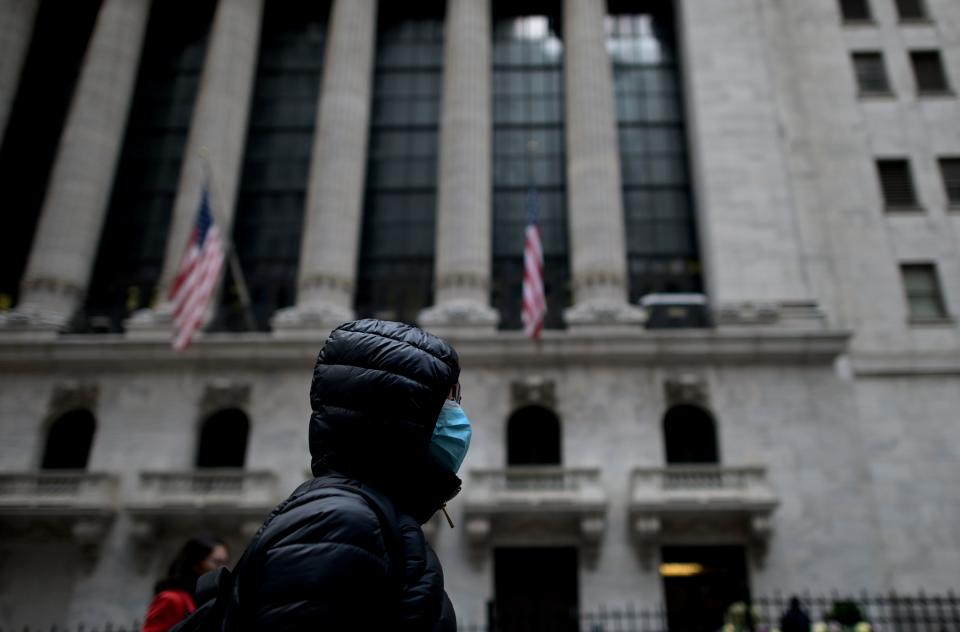Why the next 4 weeks could be lethal for the stock market
The approaching earnings season is going to plain old suck, no thanks to the coronavirus.
Just take a gander at what investors will be up against as they are hit over the head with volumes of earnings reports starting with banks and industrials this week. First, the likelihood that some quite large companies won’t have any earnings to speak of — rather steep losses as the coronavirus blows through their financial statements. Second, the sweeteners to stock ownership — dividends and stock buybacks — will be curtailed significantly with companies headed into cash preservation and restructuring mode.
Not ugly enough? Well, then you will have CFOs unlikely to put forward any form of financial guidance — that’s if they haven’t yanked outlooks already in end of quarter pre-announcements. Good luck modeling future earnings, people. Meanwhile, earnings calls where executives often attempt to spin a positive narrative no matter the environment, will mostly be devoid of that hope that usually could rally a stock despite a bad quarter.
Unless you are an investor in companies packaging Spam or Twinkies, this earnings season will be taxing on the mind and potentially lethal to the trading account.
“It will take a strong and sustainable improvement in earnings to enable the stock market to rally a lot more than it already has,” Miller Tabak chief markets strategist Matt Maley says.
So true, Matt.
Wall Street is bizarre sometimes
It never ceases to amaze me how optimistic Wall Street analysts tend to be. Being a former analyst, I get it. You talk frequently to management teams and sometimes travel with them on the road to meet investors. You pal it up with them over a steak dinner that is put on the corporate card. After a while, you could easily slip into being a mouthpiece for management in how you articulate a thesis on a stock and model forward earnings.
Obviously this shouldn’t happen and doesn’t apply to everyone on the Street, but it’s worth calling out.
In this vein, Wall Street is serving as a great mouthpiece to Corporate America at the moment. This year will be absolutely horrendous for sales and earnings, but by no way is that factored into analyst estimates ahead of one of the most atrocious earnings seasons perhaps ever.
First quarter sales for S&P 500 companies are seen rising 0.9%, according to data from Refinitiv. Earnings are expected to drop 7.5% for the quarter. For 2020, S&P 500 sales and earnings are predicted to drop 0.9% and 7.7%, respectively. The worst it will get for earnings, per Refinitiv data, is a second quarter year-over-year decline of 18%.
These estimates have to be a sick joke put together by Wall Street analysts shot-gunning White Claw while playing around on spreadsheets, right? Unfortunately for investors they aren’t — and the hopeful forecasts are about to be slashed materially in the weeks ahead, likely much to the detriment of the recent market rally.

Cautions RBC’s head of U.S. equity strategy Lori Calvasina, “We are still in the early innings of downward EPS revisions. Further downward revisions could keep equity market conditions choppy for the time being.”
Calvasina is one of the few strategists on Wall Street keeping it real with her S&P 500 profit estimates — she expects an 18% decline in earnings in 2020, almost three times worse than the current consensus.
“Previously, the macro assumptions in our model assumed a garden-variety recession in the U.S. in 2020. We’ve adjusted the model to bake in a GDP scenario more in line with the consensus among sell-side economists that have changed their forecasts in late March and early April. Generally, our model bakes in real GDP of -25% in 2Q20, and expects the economy to start climbing out of the hole in 3Q20,” Calvasina notes.
The bottom line
It has been my experience that even the worst earnings seasons have silver linings.
For instance, I remember dollar stores such as Dollar Tree and Dollar General did decent business during the Great Recession as cash-strapped consumers traded down from Walmart and Target. Of course that meant the U.S. economy was falling off a cliff, but amidst the firestorm of bad news sales increases at retailers of any kind were a welcomed site.
But this earnings season will be unlike the many Wall Street has endured. A complete shutdown of the global economy because of a major health pandemic. That will bring with it jaw-dropping earnings reports, brutal executive commentary and surprising initiatives designed to survive the pandemic’s fallout (think major corporate restructuring announcements, penalizing debt raises, etc.).
All of this will suck, mightily. The quicker investors realize that and plan for it, the better off they will be.
Brian Sozzi is an editor-at-large and co-anchor of The First Trade at Yahoo Finance. Follow Sozzi on Twitter @BrianSozzi and on LinkedIn.
Read the latest financial and business news from Yahoo Finance
Levi's reports solid quarterly earnings, CEO says jeans maker will come out of coronavirus stronger
Yum! Brands CEO on how his 50,000 restaurants are doing amidst the coronavirus pandemic
Grubhub founder: our sign-ups are surging during the coronavirus
HP CEO: here’s how we are helping coronavirus relief efforts
Follow Yahoo Finance on Twitter, Facebook, Instagram, Flipboard, SmartNews, LinkedIn, YouTube, and reddit.

 Yahoo Finance
Yahoo Finance 